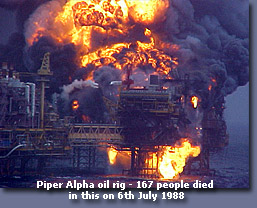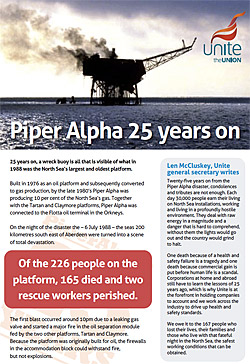Offshore workers' union RMT has criticised oil companies for 'fundamentally failing' to involve workers in health and safety matters on rigs and has demanded improvements.
This comes less than a month before the 25th Anniversary of the North Sea oil rig – Piper Alpha disaster, and one which is still the world’s worst offshore oil disaster.
 On Wednesday 6 July 1988, a series of explosions on the rig based off the north east coast of Scotland – claimed the lives of 167 people.
On Wednesday 6 July 1988, a series of explosions on the rig based off the north east coast of Scotland – claimed the lives of 167 people.
In November 1990, Lord Cullen’s report into the disaster severely criticised safety procedures on the rig. Lord Cullen chaired the official Public Inquiry into the disaster in two parts: the first to establish the causes of the disaster, the second made recommendations for changes to the safety regime.
The RMT union comments were made after the publication last week of a Health and Safety Executive (HSE) review of the effectiveness of the Offshore Installations (Safety Representatives and Safety Committees) Regulations 1989, commonly referred to as SI971. Forty one installations were checked by last year by the safety watchdog.
A total of 18 inspections resulted in formal letters because 'only partial compliance was evident and action was required to bring about improvements.'
The findings of the report show that significant numbers of 'duty holders' (Installation owners and or operators) are falling short of the mark and in a few cases are well below the standard expected. In particular, duty holders are found to be failing to properly consult workers on issues affecting health and safety, a cornerstone to engaging and involving workers in health and safety matters.
The report recommended firms 'should review their own practice on consultation to make sure they maximise the opportunities for SR involvement in decisions that affect health and safety.'
 RMT Regional Organiser Jake Molloy said in a press release;
RMT Regional Organiser Jake Molloy said in a press release;
"We've had these regulations for 22 years now and for each and every one of those 22 years industry stakeholders have been speaking about ways of improving 'workforce involvement' in health and safety. What this report shows is, the industry is fundamentally failing to involve workers in health and safety matters, as the most basic element in that process - consultation - is not occurring.
It's clear the duty holders are either reluctant or unwilling to properly consult, after all they've had 22 years to get in the way of it! It's therefore time the Safety Reps were adequately equipped to fully engage with duty holders and compel them to consult with the workforce. To do this the scope of training for safety reps must be improved."
In the "Conclusions" of the HSE report it states; "An area where DHs (Duty Holders) often failed to involve SRs (Safety reps) was in consultation. DHs should review their own practice on consultation to make sure they maximise the opportunities for SR involvement in decisions that affect health and safety."
But in the 25 years since the world’s worst offshore disaster, little seems to have changed – there remains widespread fear amongst off-shore oil field workers around reporting their health and safety concerns, as the threat of being sacked for doing so still pervades the industry.
In an article in The Guardian newspaper published yesterday 16th June, Jake Molloy is reported as saying:
"Overall safety in the North Sea has improved since Piper Alpha but I have got two safety representatives in my office now saying they cannot do what they are meant to.
You can have all the statistics and the technology in place but it does not make a blind bit of difference if people are under pressure, being bullied, or just disengaged."
The article continues:
“Molloy said oil companies subcontracted almost all North Sea work to third-party contractors, meaning those employers are more scared of losing their multimillion-pound deals through lost work time than interested in listening to difficult issues raised by their employees. Some managers rule in a climate of fear where employees dread an "NRB" (not required back) on the grounds of a one-off complaint about their behaviour, he claimed.
He said even safety representatives feared their employers and did not have the authority to halt operations as they do in Norway, where the overall industry safety record is much better.”
But under the cuts imposed upon the HSE budget by this Tory-led coalition government, and re-alignment of their week as a result, things are being made even worse, the RMT fears.
The HSE’s offshore safety division was established in line with the recommendations of Lord Cullen, as part of his report into the 1988 Piper Alpha disaster, caused by a gas leak and explosion on the Occidental Petroleum-owned platform.
 The decision by the government to dismantle the offshore safety division inside the Health & Safety Executive (HSE) and subsume its functions inside a newly created energy division covering onshore and other installations reduces their effectiveness in policing the industry fears the RMT.
The decision by the government to dismantle the offshore safety division inside the Health & Safety Executive (HSE) and subsume its functions inside a newly created energy division covering onshore and other installations reduces their effectiveness in policing the industry fears the RMT.
The RMT’s Jake Molloy is quoted by The Guardian newspaper as saying:
"HSE says this restructuring will make no difference but I remain to be convinced, as does the rest of the trade union movement in Scotland. We are also worried that the role of the HSE is being diluted.”
He has the apparent backing of the law firm Pinsent Masons, whose health and safety expert, Anna Austin, has expressed concern about the change. "The challenge that faces the proposed energy division is to maintain the same level of expertise in its regulation of offshore safety … it remains to be seen whether this can be done," she said.
Kevin Myers, the deputy chief executive of the HSE, wrote an open letter on the organisation's website, in which he insisted he was committed to strengthening offshore safety and promised the appointment of more offshore safety inspectors.
 Regulation would remain "business as usual from an external point of view … We're all agreed on the need for a robust regulatory regime offshore – we owe it to those who have lost their lives in the industry and to those who still work there," he wrote.
Regulation would remain "business as usual from an external point of view … We're all agreed on the need for a robust regulatory regime offshore – we owe it to those who have lost their lives in the industry and to those who still work there," he wrote.
Unite are also one of the Trade Unions representing workers on the North Sea Oil platforms.
Their General Secretary, Len McLusky Len McCluskey, in a Unite brochure issued for the 25th Anniversary of the disaster
writes:
"Twenty-five years on from the
Piper Alpha disaster, condolences
and tributes are not enough. Each
day 30,000 people earn their living
on North Sea installations, working
and living in a profoundly hostile
environment. They deal with raw
energy in a magnitude and a
danger that is hard to comprehend,
without them the lights would go
out and the country would grind
to halt."
Contuneing his piece on the front cover of the brochure he continues:
"One death because of a health and
safety failure is a tragedy and one
death because commercial gain is
put before human life is a scandal.
Corporations at home and abroad
still have to learn the lessons of 25
years ago, which is why Unite is at
the forefront in holding companies
to account and we work across the
industry to drive up health and
safety standards."
In conclusion, len McLuskey
We owe it to the 167 people who
lost their lives, their families and
those who live with that fateful
night in the North Sea, the safest
working conditions that can be
obtained."
Source: RMT / The Guardian / IOSH